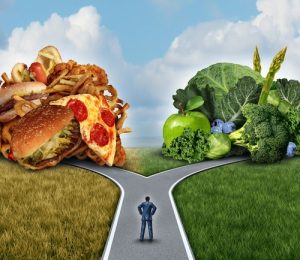What Is The Secret For Weight Loss?
Author: Dr. Stephen Chaney
Do ultra-processed foods make it harder to loose weight?
 It is so confusing. It seems like everyone has a magical weight loss diet. You just follow their diet and the pounds will melt away. The problem is that everyone’s recommendations are different. What is the average consumer to think? Is the best diet low fat, low carb, low sugar, Paleo, Keto, or vegan? Or is intermittent fasting the secret to successful weight loss?
It is so confusing. It seems like everyone has a magical weight loss diet. You just follow their diet and the pounds will melt away. The problem is that everyone’s recommendations are different. What is the average consumer to think? Is the best diet low fat, low carb, low sugar, Paleo, Keto, or vegan? Or is intermittent fasting the secret to successful weight loss?
What if the secret to weight loss was none of the diets mentioned above, yet was something common to all of them?
The one common feature of every popular diet is they cut out sodas and processed foods and replace them with whole unprocessed foods. What if cutting out highly processed foods was the secret to successful weight loss, and none of the other restrictions of the various diets really mattered?
There are lots of studies suggesting that ultra-processed foods might be the problem. [Note: In the scientific community the term highly processed foods has been replaced with ultra-processed foods. There are subtle differences between the two terms, but for our purposes we will consider them identical]. Consumption of ultra-processed foods has been shown to be associated with overeating, obesity, poor health outcomes, and premature death.
For example, consumption of ultra-processed foods and obesity have increased in parallel. Today ultra-processed foods constitute the majority of calories consumed in America, and 40% of Americans are now obese.
However, associations don’t prove cause and effect. In the words of the authors of the latest study: “There has never been a randomized controlled trial demonstrating any beneficial effects of reducing ultra-processed foods or deleterious effects of increasing ultra-processed foods in the diet.”
The latest study (KD Hall et al, Cell Metabolism, 30: 1-11, 2019 ) was the first randomized controlled trial designed to test the hypothesis that consumption of ultra-processed foods leads to obesity.
How Was The Study Done?
 Twenty overweight subjects (10 men and 10 women) volunteered for the study. Their average age was 31 and their average BMI was 27, which means they were overweight, but not obese. All were weight-stable in the months preceding the study.
Twenty overweight subjects (10 men and 10 women) volunteered for the study. Their average age was 31 and their average BMI was 27, which means they were overweight, but not obese. All were weight-stable in the months preceding the study.
They were admitted to the metabolic ward at the NIH where every aspect of what they ate and the exercise they got was controlled. The subjects were randomly assigned to consume an ultra-processed or an unprocessed diet for two weeks followed by the alternative diet for the final two weeks.
During the study the subjects were given three meals a day that provided twice the calories they were accustomed to eating plus unlimited snacks. They were instructed to eat as much or as little as they desired. The calories consumed were calculated based on how much food they left on their plates.
The ultra-processed diet and unprocessed diets were matched with respect to:
- Total calories in the food portions given to the subjects.
- Caloric density (calories per serving size).
- Macronutrients (carbohydrate, fat, & protein).
- Sugars, fiber, and sodium.
The ultra-processed and unprocessed diets were neither low fat, low carb, or high protein. The caloric composition was around 48% carbohydrate, 35% fat, and 17% protein.
However, because of the differences between ultra-processed and unprocessed foods, it was impossible to match all parameters. For example, the ultra-processed and unprocessed diets differed significantly in:
- Added sugar: 54% of the sugar in the ultra-processed diet was added sugar versus only 1% added sugar in the unprocessed diet.
- Insoluble fiber: 16% of the fiber in the ultra-processed diet was insoluble fiber versus 77% in the unprocessed diet.
- Saturated fat: 34% of the fat in the ultra-processed diet was saturated versus 19% in the unprocessed diet.
- Omega-6 to omega-3 ratio: The ratio was 11:1 in the ultra-processed diet versus 5:1 in the unprocessed diet.
To give you an example of what the two diets looked like, dinner one night for the unprocessed diet group consisted of beef tender roast with barley and spinach and a parfait made of fresh berries and nonfat, unflavored Greek yogurt while the ultra-processed diet group got processed turkey and cheese sandwiches (on white bread) with baked chips, canned peaches and nonfat vanilla Greek yogurt. For breakfast one morning the unprocessed diet group got omelets made from fresh eggs while the ultra-processed diet group got omelets made from Fresh Start liquid.
Do Ultra-Processed Foods Make You Fat?
 The results of the study were quite interesting:
The results of the study were quite interesting:
- Subjects ate an additional 508 calories per day when on the ultra-processed diet.
- Those extra calories came from both carbohydrate and fat, not from protein.
- Subjects gained 2 pounds in just two weeks on the ultra-processed diet and lost 2 pounds in two weeks on the unprocessed diet.
- Subjects ate their food more quickly on the ultra-processed diet (50 calories/minute) than on the unprocessed diet (32 calories/minute).
The authors of the study asked the participants several subjective questions about the two diets to better understand why they consumed more calories on the ultra-processed diet. However, those questions did not provide any useful insights. For example, the subjects rated the two diets equally with respect to:
- Palatability and familiarity of the foods in the diet.
- Hunger prior to eating and both fullness and satisfaction when they were finished eating.
These findings surprised the authors. The authors had assumed their subjects would eat more ultra-processed foods because they liked them better.
With respect to the overall study results, the authors concluded: “Limiting consumption of ultra-processed foods may be an effective strategy for obesity prevention and treatment.”
In short, their study confirms what many experts have long suspected, but does not provide a mechanistic explanation of why ultra-processed foods lead to overconsumption and obesity.
What Is The Secret For Weight Loss?
 The arguments over which diet is best for weight loss never end. Everyone claims they have the secret, and everyone quotes studies showing their diet works.
The arguments over which diet is best for weight loss never end. Everyone claims they have the secret, and everyone quotes studies showing their diet works.
Yet the diets are as different as night and day. They shouldn’t all work, but they do. For example, weight loss is virtually identical on a very low-fat vegan diet and a very low carb keto diet. That tells us that the secret can’t be either low-fat or low carb.
The secret must be something all these diets have in common. When you ask what they have in common, the answer is simple. All the popular diets start by eliminating sodas and ultra-processed foods and replacing them with unprocessed foods.
Could it be that something as simple as eliminating sodas and ultra-processed foods and replacing them with unprocessed foods is the secret to successful weight loss? Many experts have hypothesized that ultra-processed foods were the cause of the obesity epidemic, but this is the first randomized controlled clinical trial to prove that hypothesis.
Like any individual study, this study needs to be confirmed by additional randomized controlled studies. One might hope for longer duration studies with more subjects, but it would be very difficult to duplicate the precision of this study. Asking volunteers to enter a metabolic ward where every aspect of their life is controlled for multiple weeks is both expensive and a huge commitment by the volunteers.
My recommendation is simple. You don’t have to choose radical diets that eliminate whole food groups to lose weight successfully. They are hard to follow and may not be healthy long-term. Just ditch the sodas, junk foods, and highly processed foods. Rediscover the pleasures of whole unprocessed foods. You will lose weight gradually and safely. You will be healthier.
Of course, it is not quite that simple.
- Portion control is essential. You can eat too much unprocessed food.
- Caloric density (calories per serving) is important. This is one reason why primarily plant-based diets are generally more successful for long-term weight control.
- Practice mindful eating. Savor your food and eat it slowly. You will be less likely to overeat.
- And, of course, don’t neglect the exercise component.
For a more detailed analysis of the pros and cons of popular diets, read my book, “Slaying The Food Myths.”
The Bottom Line
It seems like everyone has a magical weight loss diet. You just follow their diet and the pounds will melt away. The problem is that everyone’s recommendations are different. What is the average consumer to think? Is the best diet low fat, low carb, low sugar, Paleo, Keto, or vegan? Or is intermittent fasting the secret to successful weight loss?
What if the secret to weight loss was none of the diets mentioned above, yet was something common to all of them? The one common feature of every popular diet is they cut out sodas and processed foods and replace them with whole unprocessed foods.
For years experts have claimed that the consumption of highly processed foods is responsible for the obesity epidemic and replacing ultra-processed foods with unprocessed foods was the secret to successful weight loss. However, those claims are based on associations, and association studies do not prove cause and effect.
Finally, the first randomized controlled trial to test this hypothesis has been published. The study showed:
- Subjects ate an additional 508 calories per day when on the ultra-processed diet.
- Subjects gained 2 pounds in just two weeks on the ultra-processed diet and lost 2 pounds in two weeks on the unprocessed diet.
My recommendation is simple. Just ditch the sodas, junk foods, and highly processed foods. Rediscover the pleasures of whole unprocessed foods. You will lose weight gradually and safely. You will be healthier.
Of course, it’s not quite that simple. I discuss other aspects of successful weight loss in the article above.
For a more detailed analysis of the pros and cons of popular diets, read my book, “Slaying The Food Myths.”
For more details read the article above.
These statements have not been evaluated by the Food and Drug Administration. This information is not intended to diagnose, treat, cure or prevent any disease.
